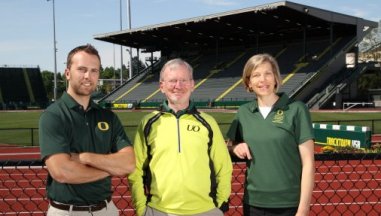EUGENE, Ore. -- (June 20, 2012) – As final preparations are underway for the 2012 Olympic Team Trials - Track & Field in Eugene beginning June 22, a research paper by faculty of the University of Oregon’s Lundquist College of Business focuses on a revival of the TrackTown USA identity.
“Rekindling the Flame: Processes of Identity Resurrection” has been accepted for publication in an upcoming edition of the Academy of Management Journal. It examines how after a 28-year hiatus, the 2008 Olympic Trials’ return to Eugene revitalized the “TrackTown USA” identity that formed in the early 1970s.
 The paper is written by Jennifer Howard-Grenville, professor of management at UO; Matthew Metzger, professor of entrepreneurship and innovationat the University of Colorado-Colorado Springs who is completing his doctorate at the UO; and Alan Meyer, Charles H. Lundquist Professor Emeritus of Management.
The paper is written by Jennifer Howard-Grenville, professor of management at UO; Matthew Metzger, professor of entrepreneurship and innovationat the University of Colorado-Colorado Springs who is completing his doctorate at the UO; and Alan Meyer, Charles H. Lundquist Professor Emeritus of Management.
“As organizational scholars analyzing the TrackTown identity, we found implications for communities and organizations, many of which try unsuccessfully to reinvent themselves with branding and logos,” said Howard-Grenville. “Instead, they should go deeper to tap into stewards who value the past and bring it forward for others, and reach beyond rational arguments to make emotional connections to the identity.”
Researchers conducted in-depth personal interviews with individuals involved with the rise, decline and resurrection of the TrackTown USA identity, including current and former coaches, athletes, journalists, historians and visitors bureau officials. The result was more than 200 pages of answers to questions about the meaning of “TrackTown,” the symbols of the identity, and how and why the identity changed over time.
In addition, researchers volunteered at the 2008 Olympic Trials and attended more than 25 additional track meets, including the 2010 NCAA National Championships and the 2009 and 2011 U.S. National Outdoor Championships. They also competed in local road races and recreational running events on city trails, and viewedvideo footage, photographs and media accounts that captured the emotional tenor of past events.
“What is remarkable about TrackTown is its resurrection,” said Meyer. “Resurrection is harder than giving birth, and what is so extraordinary about Eugene 08 was that it brought back the ethos, the spirit, the enthusiasm, and the fans that originally formed the identity decades ago in TrackTown’s heyday.”
The paper finds that “TrackTown’s distinctiveness was forged by two processes: a) community engagement in the sport, as reflected in the relational system that connected the city’s elites, residents, fans and athletes; and b) a sustained pattern of events that cultivated a unique track and field experience in Eugene and elicited a spirited emotional response from residents, fans and athletes.”
The role of UO coach Bill Bowerman was instrumental for TrackTown, according to the paper. Bowerman’s concern for building strong relationships between the sport of track and field and the Eugene community led to the formation of the Oregon Track Club, and to the institution of all-comers meets and jogging clinics open to the public. When Steve Prefontaine arrived at UO in 1969, “the community was primed to be captivated by his brash, no holds-barred running style and athletic accomplishments, which included seven NCAA titles and numerous American records,” according to the paper. As a result, Eugene’s residents became renowned for their knowledge of track and field and emotional connection to the sport.
Shortly after the 1972 Olympic Trials cemented Eugene’s identity as TrackTown, two events halted the momentum. Bill Bowerman retired from coaching in 1973, and three years later, Steve Prefontaine died in a car accident. The energy that Bowerman and Prefontaine created in TrackTown continued for a time under new coach Bill Dellinger, a former UO runner and Bowerman’s assistant coach. But by 1998, 25 years after Dellinger took over as coach, the consensus was that Eugene’s time as “TrackTown” was in the past.
In 2005, Vin Lananna was named head coach for the UO and revitalization of the TrackTown identity began. Hosting a major, signature track and field event was central to the vision that Lananna and other leaders held for kick-starting the resurrection. The vision was set in motion when the community was selected to host the 2008 Olympic Team Trials. The 2008 event exceeded expectations for community attendance, volunteer involvement, local athlete performance and economic impact to the area, which was estimated at $28 million by Travel Lane County.
According to Meyer, the paper identifies three ingredients necessary to pull off the resurrection of a brand’s identity, as can be observed in the cases of Apple Computers, Harley-Davidson and TrackTown USA.
“There must be custodians who are passionate about stewardship of the identity, unfolding events that elicit powerful emotions from organizational members or community residents, and outcomes judged to be authentic in that they resonate with the established identity,” said Meyer. “Our findings suggest that perpetuating a collective identity is an ongoing accomplishment dependent upon the actions of both leaders and members.”
About the University of Oregon
The University of Oregon is among the 108 institutions chosen from 4,633 U.S. universities for top-tier designation of "Very High Research Activity" in the 2010 Carnegie Classification of Institutions of Higher Education. The UO also is one of two Pacific Northwest members of the Association of American Universities.
MEDIA CONTACT: Julie Brown, UO media relations, 541-346-3185, julbrown@uoregon.edu
SOURCES:
Jennifer Howard-Grenville, associate professor of management at UO, 541-346-3347, jhg@uoregon.edu;
Matthew L. Metzger, assistant professor of entrepreneurship and innovationat the University of Colorado- Colorado Springs who has just completed his PhD at the UO, 541-743-1055, mmetzger@uccs.edu
Alan D. Meyer, Charles H. Lundquist Professor Emeritus of Managementat UO, 541-346-5178, ameyer@uoregon.edu.
Note: The University of Oregon is equipped with an on-campus television studio with satellite uplink capacity, and a radio studio with an ISDN phone line for broadcast-quality radio interviews.
###